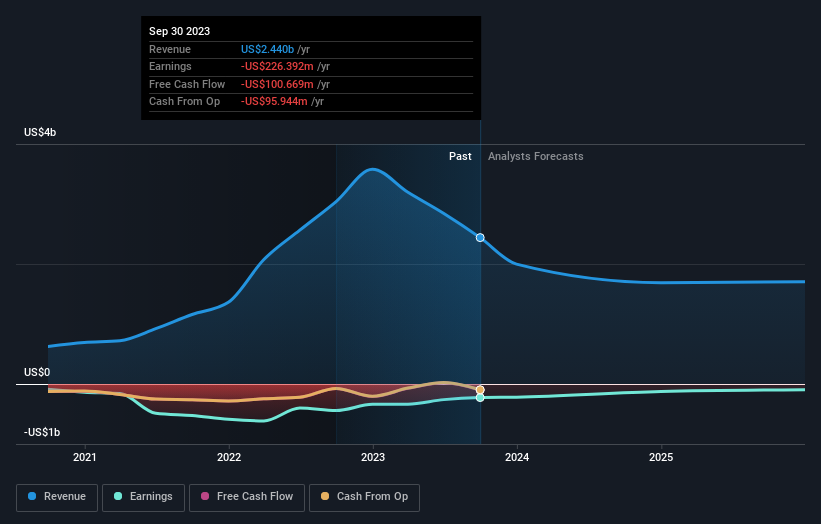Clover Health Investments, Corp.'s (NASDAQ:CLOV) top owners are individual investors with 57% stake, while 23% is held by insiders
Key Insights
Clover Health Investments' significant individual investors ownership suggests that the key decisions are influenced by shareholders from the larger public
40% of the business is held by the top 25 shareholders
To get a sense of who is truly in control of Clover Health Investments, Corp. (NASDAQ:CLOV), it is important to understand the ownership structure of the business. We can see that individual investors own the lion's share in the company with 57% ownership. In other words, the group stands to gain the most (or lose the most) from their investment into the company.
And individual insiders on the other hand have a 23% ownership in the company. Generally speaking, as a company grows, institutions will increase their ownership. Conversely, insiders often decrease their ownership over time.
Let's take a closer look to see what the different types of shareholders can tell us about Clover Health Investments.
See our latest analysis for Clover Health Investments
What Does The Institutional Ownership Tell Us About Clover Health Investments?
Many institutions measure their performance against an index that approximates the local market. So they usually pay more attention to companies that are included in major indices.
We can see that Clover Health Investments does have institutional investors; and they hold a good portion of the company's stock. This can indicate that the company has a certain degree of credibility in the investment community. However, it is best to be wary of relying on the supposed validation that comes with institutional investors. They too, get it wrong sometimes. It is not uncommon to see a big share price drop if two large institutional investors try to sell out of a stock at the same time. So it is worth checking the past earnings trajectory of Clover Health Investments, (below). Of course, keep in mind that there are other factors to consider, too.
Hedge funds don't have many shares in Clover Health Investments. Because actions speak louder than words, we consider it a good sign when insiders own a significant stake in a company. In Clover Health Investments' case, its Top Key Executive, Vivek Garipalli, is the largest shareholder, holding 18% of shares outstanding. Meanwhile, the second and third largest shareholders, hold 6.3% and 3.9%, of the shares outstanding, respectively.
Our studies suggest that the top 25 shareholders collectively control less than half of the company's shares, meaning that the company's shares are widely disseminated and there is no dominant shareholder.
While it makes sense to study institutional ownership data for a company, it also makes sense to study analyst sentiments to know which way the wind is blowing. There are a reasonable number of analysts covering the stock, so it might be useful to find out their aggregate view on the future.
Insider Ownership Of Clover Health Investments
The definition of company insiders can be subjective and does vary between jurisdictions. Our data reflects individual insiders, capturing board members at the very least. Company management run the business, but the CEO will answer to the board, even if he or she is a member of it.
I generally consider insider ownership to be a good thing. However, on some occasions it makes it more difficult for other shareholders to hold the board accountable for decisions.
Our information suggests that insiders maintain a significant holding in Clover Health Investments, Corp.. Insiders own US$108m worth of shares in the US$463m company. It is great to see insiders so invested in the business. It might be worth checking if those insiders have been buying recently.
General Public Ownership
The general public, mostly comprising of individual investors, collectively holds 57% of Clover Health Investments shares. This size of ownership gives investors from the general public some collective power. They can and probably do influence decisions on executive compensation, dividend policies and proposed business acquisitions.
Next Steps:
I find it very interesting to look at who exactly owns a company. But to truly gain insight, we need to consider other information, too. Take risks for example - Clover Health Investments has 3 warning signs we think you should be aware of.
Ultimately the future is most important. You can access this free report on analyst forecasts for the company.
NB: Figures in this article are calculated using data from the last twelve months, which refer to the 12-month period ending on the last date of the month the financial statement is dated. This may not be consistent with full year annual report figures.
Have feedback on this article? Concerned about the content? Get in touch with us directly. Alternatively, email editorial-team (at) simplywallst.com.
This article by Simply Wall St is general in nature. We provide commentary based on historical data and analyst forecasts only using an unbiased methodology and our articles are not intended to be financial advice. It does not constitute a recommendation to buy or sell any stock, and does not take account of your objectives, or your financial situation. We aim to bring you long-term focused analysis driven by fundamental data. Note that our analysis may not factor in the latest price-sensitive company announcements or qualitative material. Simply Wall St has no position in any stocks mentioned.


